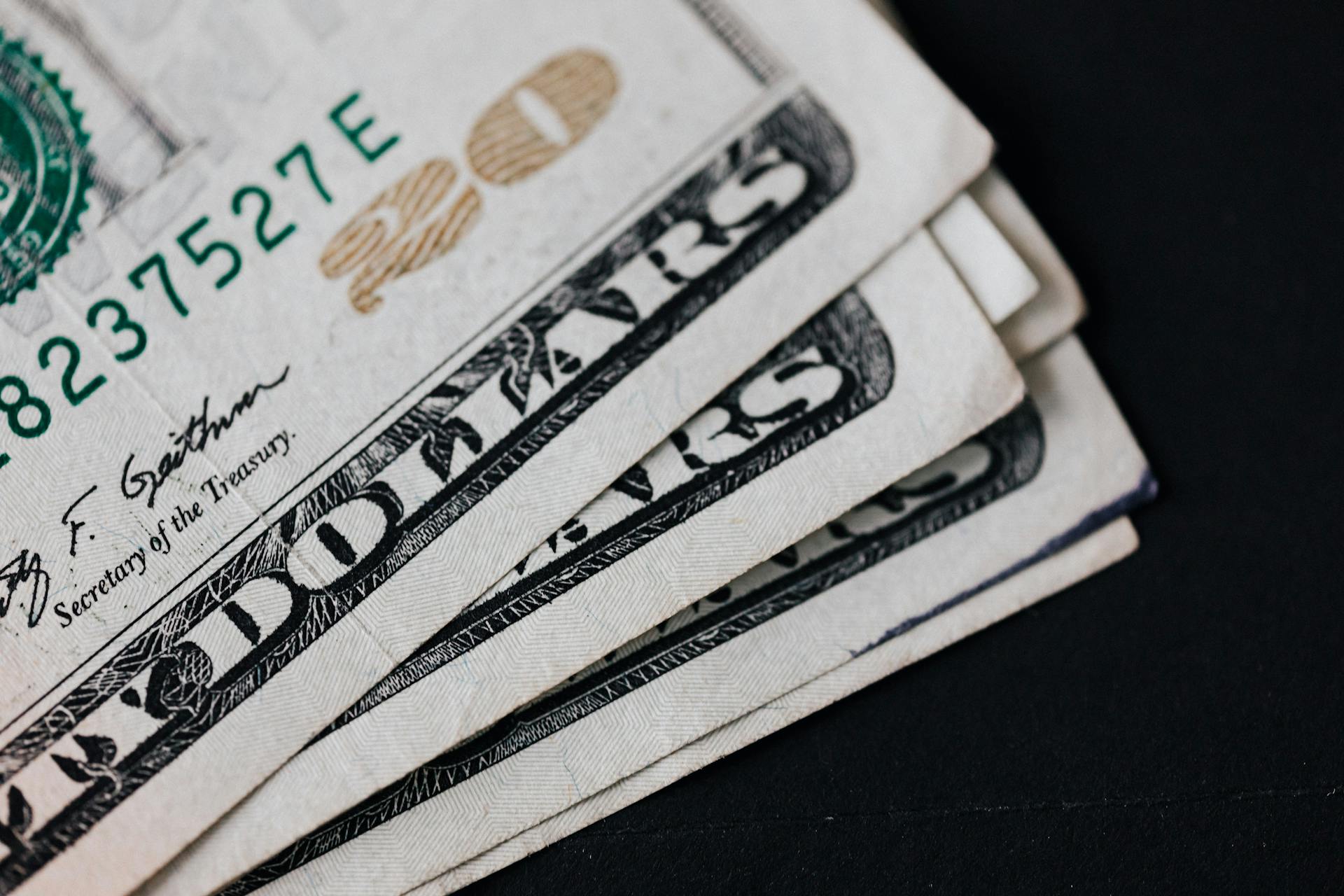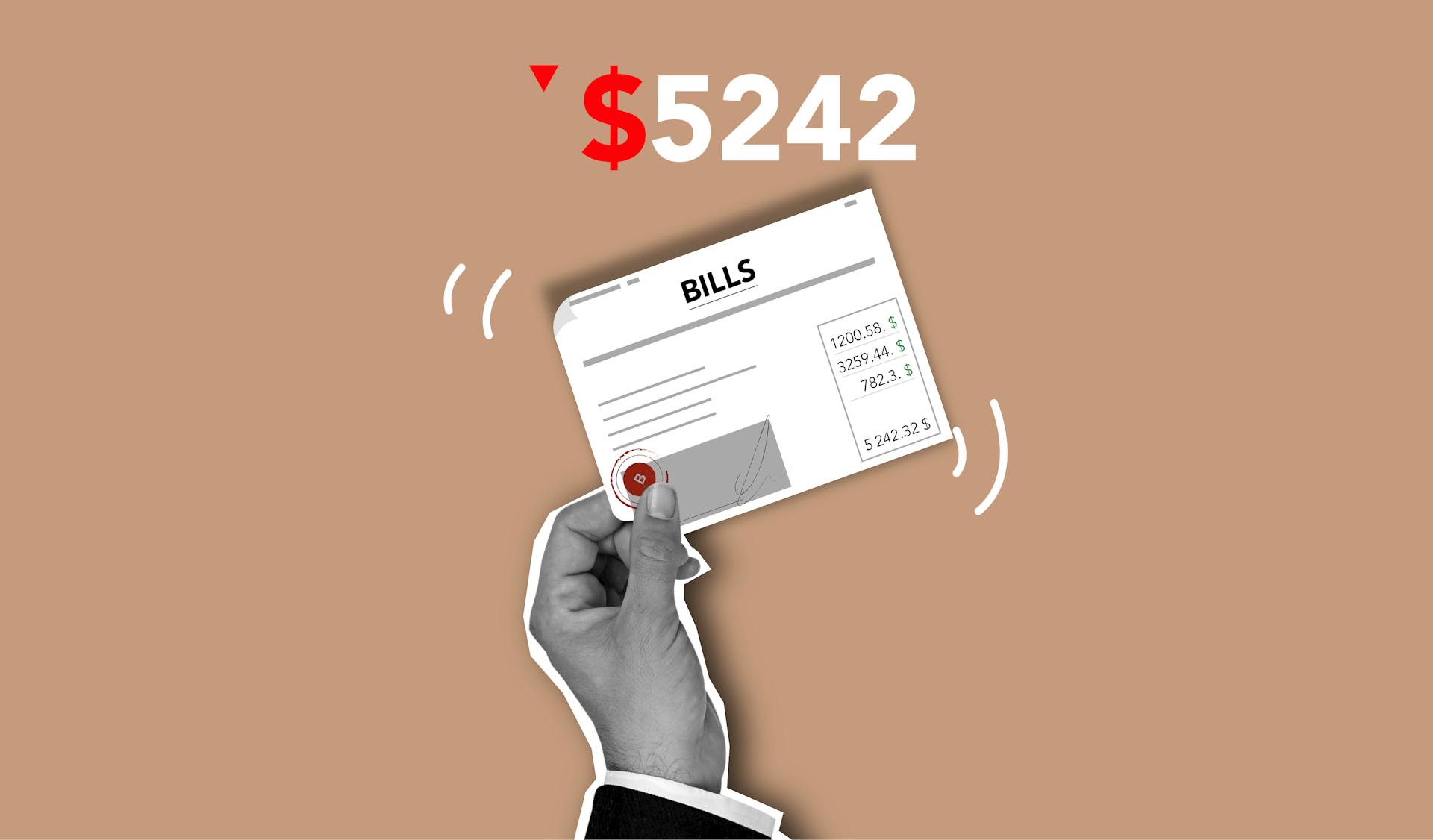
Do you ever get that anxious feeling in your stomach when you haven't checked your bank account in a while? You're not alone. Many people experience what is commonly referred to as "bank account anxiety." With the holiday season upon us, and Black Friday money spent, financial instability can be a trigger for this type of anxiety disorder.
Some individuals may tap dance around their money anxiety by using go-to coping mechanisms, such as avoiding their bank account for long stretches of time due to the fear of what they might find. Others may simply practice what they jokingly call intuitive spending, which is really just a form of avoidance persisting despite knowing wtf is actually going on with their finances. A recent internet observation conducted through a totally unscientific survey found that this ridiculously common behavior is experienced by many, but few know how to effectively manage it.
If you've been struggling with bank account anxiety, don't worry – there are ways to overcome it! In this article, we'll explore some simple tips and strategies that can help you find answers and balance anxiety. Here's how to take control of your finances and overcome your bank account anxiety once and for all.
Don't Worry About Bank Account Anxiety, It's Normal!

Let's talk about bank account anxiety. Yeah, sounds familiar, right? It's that feeling of dread you get when you think about checking your bank accounts or looking at those numbers making up your balance. But don't worry, it's normal! Originally avoiding money eventually leads to avoidance isn't a healthy adaptive response.
Luckily, Clayman has a goal to help people with financial awareness and moderation avoidance. If you're anxious about checking your bank account or using a banking app, the key is exposure therapy. Practice approaching your bank account in small steps and don't check it every day.
Anxiety isn't something we can just fix overnight. But by practicing exposure therapy and confronting our fears instead of avoiding them, we can learn to manage our bank account anxiety. So don't let the fear take over - take control of your finances and face them head-on!
The Impact of Money Anxiety: How it Can Affect You
Financial anxiety or bank account anxiety can have a significant impact on one's mental health. The emotional concerns including stress, depression, and anxiety can cause sleep problems, physical health issues and even strained relationships with family and friends. It is important to address these feelings head-on by seeking professional help, creating realistic financial goals, and developing healthy coping mechanisms to alleviate the negative effects of money anxiety.
Spotting the Indicators: What You Need to Look Out For
Money anxiety is a real and valid emotional response to one's financial situation. It's important to understand basic terms like income, expenses, and budgeting in order to identify if you're experiencing money anxiety. However, money anxiety doesn't necessarily mean that your bank account is in dire straits. Even if you have a perfectly decent financial situation, an unexpected medical bill or major expense can trigger an uneasy feeling.
If you find yourself constantly worrying about how you'll pay your current bills easily or running errands for minor decisions that could be made quickly, it may be a sign of analysis paralysis. This could be due to money anxiety or simply overthinking things. It's important to take a step back and reevaluate your work-life balance so that you can stay afloat without sacrificing your mental health.
If you find yourself having trouble sleeping, lying awake at night wondering how you'll pay for an unexpected expense, it may be time to seek help for your anxiety conditions. Stop thinking about the stock market multiple times throughout the day and focus on taking care of yourself first. By identifying the indicators of money anxiety early on, you can take steps towards managing it effectively and living a happier life.
Discover Various Techniques for Keeping Track of Your Money
If you're someone who experiences bank account anxiety, it's time to take action and increase your financial awareness. One of the simplest ways to do this is by using a banking app regularly. This will allow you to monitor your spending, set budgets, and receive alerts when you reach certain thresholds. By checking your account regularly, you can avoid any surprises or unexpected fees.
Another helpful technique for keeping track of your money is calendar making. If you have a vague goal in mind, such as saving for a vacation or paying off debt, create a firm nonnegotiable date – don't wait for some magical confluence of events to occur. By setting a deadline and breaking down smaller tasks on a calendar method, you'll be more likely to achieve your goal. Plus, seeing progress on paper can boost your mood – hey, who doesn't love crossing items off their list?
Finally, consider using an automatic tracker instead of manually entering every single expense into a spreadsheet. If the thought of money diving into the negative headspace makes you cringe or feel overwhelmed, an automatically connect chosen method may be better suited for you. There are plenty of apps out there that sync with your accounts and categorize your spending so that all the work is done for you!
Effective Strategies for Dealing with the Situation

Are you facing persistent money worries that are causing bank account anxiety? It's understandable to feel overwhelmed and anxious about your financial situation, but fears won't make it go away. The first step towards addressing your bank account anxiety is to acknowledge the underlying financial issues provoking these feelings.
One effective strategy for dealing with bank account anxiety is to create a budget and stick to it. This can help you gain better control over your finances and reduce the uncertainty that often leads to anxiety. You can also seek professional help, such as financial advisors or credit counselors, who can offer guidance on managing debts and improving your financial situation. Remember, taking action is key when dealing with bank account anxiety.
1. Join a union
Joining a union can provide many benefits that can help ease bank account anxiety. Union members tend to have higher pay, better job security, and extra social support. A 2013 British study considered companies undergoing organizational changes, and found that union members tended to experience less stress than non-union employees.
By joining a union, individual workers gain bargaining power when it comes to things including wages, benefits, and working conditions. This can be especially helpful during times of financial hardship, such as budget cuts lowering the amount of money available for salaries or benefits. Union negotiation appeared to be an effective tool in ensuring job stability for workers during difficult economic times. Overall, joining a union can provide many advantages for workers looking to feel more financially secure and reduce their bank account anxiety.
Overcoming the Burden of Financial Anxiety and Stress
Many people experience anxiety when it comes to their bank accounts. Our brains' natural reaction to financial stress is sustained anxiety, which can impact our mental health and day-to-day life. The anxiety stems from feeling out of control and overwhelmed by our finances.
To regain control, it's important to find coping methods that work for you. This may involve seeking help from a mental health professional or finding resources online. It's essential to find balance in your finances and prioritize what is most important.
One way to stop anxious thought patterns is by practicing mindfulness and focusing on the present moment. Remember that financial stress is a common experience, and there are ways to overcome it with time and effort. By taking steps towards financial stability, you can reduce the burden of financial anxiety and stress in your life.
1. Banish Financial Shame
Are you feeling ashamed of your money situation due to past financial mismanagement or incorrect budgeting? It's common to feel bad about our past mistakes, but it's important to remember that our past habits don't define our future plans. Instead of feeling embarrassed, let's focus on taking a healthier path towards proper financial practices.
One way to do this is by confronting the numbers that make us feel uncomfortable. Taking an honest look at our finances can be scary, but it helps reduce financial shame and allows us to create a plan for the future. Don't feel awkward about seeking help from a financial advisor or support group. Banishing financial shame starts with acknowledging the problem and taking action towards creating a better future for ourselves.
2. See a Financial Planner or Advisor
If you're struggling with bank account anxiety, don't make the mistake of thinking financial advisors are only for the wealthy making millions. A financial advisor helps calm your fears and ensures you're on track to meet your financial goals, whether it's saving for retirement or hoping to start investing. They can be a great assistance in helping you locate vetted advisors and finding a no-obligation low-pressure environment to discuss your finances.
Many financial advisors offer more than just basic budgeting advice; they can work with you to create a long-term relationship based on your needs and comfort level. So if you feel comfortable making the first step, consider reaching out to a qualified financial advisor like SmartAsset who can help guide you towards greater financial stability. Don't let bank account anxiety hold you back from achieving your goals – take control of your finances today!
3. Contribute to an Emergency Fund
No matter how well we plan our finances, there will always be unknown events that can disrupt even the best-laid personal finance plans. A job loss, illness, death, natural disasters or car repair can all throw a wrench in our financial plans. That's why it's important to have an emergency fund set up for such situations. A 2020 survey by Bankrate found that only 39% of Americans have enough money set aside to cover an unexpected expense of $1,000 or more.
Contributing to an emergency fund is always a good time. Whether you haven't started one yet or you already have one but want to continue contributing, it's important to work towards having at least three months' worth of living expenses saved up in a high-yield account like CIT Bank. This ensures that if any emergency adds up, you have money set aside for emergency purposes and your nest egg remains untouched. So start saving now and avoid bank account anxiety when faced with unforeseen circumstances like illness, accident or job loss.
4. Stop Comparing Yourself — Especially Online
It's easy to get caught up in the highlight reel of social media influencers' wealth, their trips, cars, and homes. But it's important to remember that what people post online doesn't always represent their full financial life. These are clear indicators that the stress level caused by comparison can affect your bank account as well.
Save money aren't solely based on the effort social media doesn't show. Hard work and past experiences all play a role in an individual's financial success. It's important to remember that each person's financial journey is unique, and personal financial goals should be based on their individual lifestyle and family situation. Don't let others' perceived financial success be your measuring stick for financial health. Gain control of your own savings account with an accurate monthly budget instead of feeling stressed by what you see on social media accounts.
Frequently Asked Questions
How to deal with anxiety around money?
To deal with anxiety around money, start by creating a budget and tracking expenses. Consider seeking professional help if necessary, and try to focus on the present rather than future financial worries.
How to manage financial anxiety & stress?
To manage financial anxiety and stress, it's important to create a budget and stick to it, seek professional help if needed, practice self-care and mindfulness techniques, and focus on the present moment instead of worrying about the future.
Does Money anxiety cause discord in relationships?
Yes, money anxiety can cause discord in relationships as it can lead to disagreements about spending, saving and debt management. It is important to address these issues openly and seek professional help if needed.
Is your financial stress causing your anxiety?
Yes, financial stress can cause anxiety as it can lead to feelings of uncertainty and lack of control over one's life. Seeking help from a financial advisor or therapist can provide coping mechanisms and strategies to alleviate anxiety caused by financial stress.
Are your finances a source of stress?
Yes, my finances are a source of stress.
Featured Images: pexels.com


